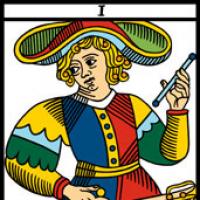メッセージ: 11
言語: Esperanto
aallen (プロフィールを表示) 2014年9月5日 6:40:28
Now I know what you're going to say about the -n accusative and it's direct correlation with the sentence structure, but I don't want to talk about that. It takes me a few seconds longer to decipher it the way it is intended when it's placed in that order even with the accusative since English is my native language (and we don't have an accusative).
I have found that I mostly require my reading to be in direct order as it is in English so that it would look like this "Kian pomo(n) faras Ana havas" or "Kian pomo(n) faras ana havi" which to me reads as "What kind of apple does Ana have".
Some might see this as a mouthful and therefor consider it wrong. I have seen several methods detailing this issue but I've not seen much definitive structure due to a lack of resources on my part.
As I teach myself through this website, and from Kurso de Esperanto, I am sometimes confused and lack the clarity that one would ordinarily receive from someone more experienced. I am also teaching my two young children as I go and I would prefer to relay the correct information to them for obvious reasons.
Would it be acceptable to say "Kian pomo(n) faras Ana havas (aŭ havi)" and not be looked at with disdain? I know the main issue with most Esperantists is when they hear what appears to be "Broken Esperanto" and I don't wish to insult or confuse anyone that I may come into contact with in the future.
Thanks in advance,
Aaron
Nile (プロフィールを表示) 2014年9月5日 6:53:53
But, about your sentence, that isn't what fari means. English makes questions in a very distinctive manner.
aallen (プロフィールを表示) 2014年9月5日 7:10:30
Nile:that isn't what fari means.From my understanding, "fari" means "to do" and "faras" means "doing / does". I'm well aware of the differences in most Esperanto words like scias / konas which both say "know" but have different definitions much like "live - we let it live" versus "live - we watched the concert live".
As for now I'm at the mercy of the Google Translator which has always translated "do/does/doing/did" as "fari/faras/faras/faris".
orthohawk (プロフィールを表示) 2014年9月5日 7:45:38
aallen:The problem lies in English syntax. There are three forms of the present tense in English: I go, I am going, and I do go. This latter form is mostly used in questions (becoming "Do I go?" being simply the inversion of the conjugated verb {"do"} and the subject plus the infinitive {the "to-less infinitive" in this case}) or negative statements: "I do not go".Nile:that isn't what fari means.From my understanding, "fari" means "to do" and "faras" means "doing / does". I'm well aware of the differences in most Esperanto words like scias / konas which both say "know" but have different definitions much like "live - we let it live" versus "live - we watched the concert live".
As for now I'm at the mercy of the Google Translator which has always translated "do/does/doing/did" as "fari/faras/faras/faris".
In Esperanto (as well as most Romance languages and other languages) there is either only one form (as in, I believe, Asturian which ONLY has the simple form) or else the simple form is by far the most used, with other forms only being used in very specific circumstances (as in Esperanto: Mi faras {I make} vs Mi estas faranta {I am making} or in Spanish, "hago" {I make} vs. "Estoy haciendo" {I am making}). The simple "x-as" form in Esperanto is used, by far, for all three English forms: the answer to "what kind of apple does Ana have" is NOT "Ana does have a yellow apple" but rather simply "Ana has a yellow apple." An alternative form of a question in English (usually, I think, considered very formal language) is the simple inverting the verb and the subject: What kind of apple has Ana? vs What kind of apple does Ana have? The answer to both is "Ana has a yellow apple." and not "Ana has a yellow apple" for the one and *"Ana does have a yellow apple" for the other.
Note that with "to be" the inverted form is the only one that is acceptable: Are you insane?? being the question form of "you are insane" and not *Do you be insane?? Unlike asking if one has an apple: "do you have an apple" is the way we usually say it, but "have you an apple" is perfectly grammatical (if a little formal sounding).
In short, use the simple -as form for the present tense in Esperanto, unless there is a very good reason (and "that's the way English works" is NOT a very good reason, lol), in all cases: simple declarative sentences, questions, and negative sentences (Mi faras, Ĉu mi faras and Mi ne faras).
(and for future reference, if most of your post is going to be in English {as here} it's better to put it in the English forum, even if it is a question about Esperanto).
johmue (プロフィールを表示) 2014年9月5日 8:01:35
aallen:From my understanding, "fari" means "to do" and "faras" means "doing / does".That's right. But in your sentence "What kind of apple does Ana have?" the verb is not "to do" but "to have". The word "does" is only an auxiliary verb. There are several auxiliary verbs in English or verbs that can serve as auxliliary verb: "to do", "to have" (to build perfect tense), "to go" (in the sense of "I am going to teach you grammar" ). Esperanto does not use auxiliary verbs. So the verbs that are auxiliaries in English don't appear in Esperanto.
Examples:
"What kind of apple does Ana have?"
"Kian pomon Ana havas?" (no "faras" in there)
"I don't like mondays."
"Mi ne ŝatas lundojn." (no "faras" in there)
"I have been studying Esperanto for three years."
"Mi studis Esperanton dum tri jaroj." (no "havas" in there)
"You are going to be a fluent Esperanto speaker."
"Vi estos flua Esperanto-parolanto." (no "iras" nor "estas" in there)
aallen (プロフィールを表示) 2014年9月5日 8:15:49
I see now how it would be confusing to use 'fari' in reference to "he does have / li faras havi" in the literal sense versus "he has / li havas" or any other variation where auxiliary words are intended but not used.
I greatly appreciate all of your time and assistance with this matter.
Aaron
pohli (プロフィールを表示) 2014年9月5日 9:23:59
Negation is expressed with "do" as well in many English phrases:
He doesn't go there. = *He goes not there.*
"do" in this sentence again does not translate as "fari", it is just an auxiliary to make a correct English sentence, and as such it won't be translated. You do not translate single words, you translate the meaning of a sentence.
So far about English grammar. Now you try and project that English grammar on Esperanto. This might help you understand a sentence, but you will have a hard time getting used to correct Esperanto grammar.
It is far more helpful to do it the other way around: project Esperanto grammar on an English sentence by translating Esperanto word-for-word, before you try to translate it to correct English. This way you will get a feeling for Esperanto's sentence structure.
So what you should do is this:
Kian pomon havas Ana? = What-kind-of apple has Ana = What kind of apple does Ana have?
Kien li iras? = Where he goes? = Where does he go?
Li ne scias. = He not knows. = He doesn't know.
This approach helped me a lot in learning languages. You will find that Esperanto grammar is not complicated, rather it is just different from what you're used to.
yugary (プロフィールを表示) 2014年9月7日 10:45:01
aallen:I sometimes have difficulty reading / comprehending Esperanto when I come across something like this "Kian pomon havas Ana?" which I read as "What kind of apple has Ana" at first glance.I don't know where you're from in the United States, but I (also from the U.S., albeit a southerner) don't understand what's wrong wih "What kind of apple has Ana?"
aallen (プロフィールを表示) 2014年9月9日 13:01:08
yugary:I don't know where you're from in the United States, but I (also from the U.S., albeit a southerner) don't understand what's wrong wih "What kind of apple has Ana?"Perhaps that was the way people talked before the early 80's (when I was born) in the U.S. but that is not the way people talk here that I have ever heard.
I've never heard anyone ever ask / say "What kind of car has Ana?". It has always been "What kind of car *do they have?" or "*does Ana have?"
That being said, I do believe that orthohawk, johmue, and pohli explained it best about auxiliary words and how they function to "make a correct English sentence" and their direct correlation with Esperanto and how they're not needed in most instances with Esperanto.
Initially I thought -is, -as, and -os as past, present, and future tenses only and didn't realize there were implied auxiliary words that weren't directly used in specific sentences.
On another note, "What kind of apple has Ana?" might possibly be the proper way to say it in U.K. English and I can concede to that whereas I've not seen that in U.S. English.
It may also be a direct result of individuals that are used to seeing such behavior in other languages and are more familiar with these results as someone with limited experience with anything other than English would see it and be confused at first.
Fenris_kcf (プロフィールを表示) 2014年9月9日 15:00:13
[en] Since it seems you did not understand the subtile appeal made by Terurĉjo: Would you mind continuing this discussion in Esperanto?



